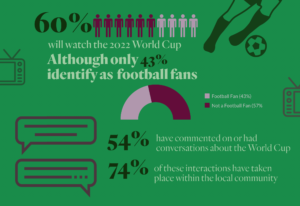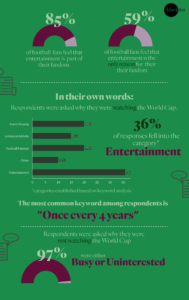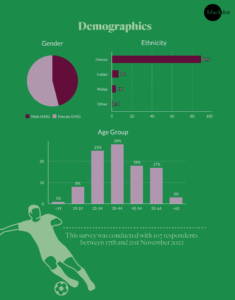
Singaporeans and the 2022 FIFA World Cup
The 2022 FIFA World Cup in Qatar runs through November and December. From the moment Qatar was named as the host in 2010, there has been ongoing debate on their suitability and what their selection means for football. Since then, controversies have continued to build even as the group stages have begun.
Costing more than the previous 7 tournaments combined at $220 Billion, the high costs are just one of many issues critics have raised. On a global scale, there have been protests, condemnation, and official boycotts of the tournament by countries, broadcasters, and sports organisations. For instance, several French cities recently announced a boycott on the broadcasting of the tournament over alleged migrant worker rights violations and environmental repercussions of the event in and by Qatar. Yet, matches are still currently being widely broadcast all around the world – and Singapore is no exception.
We surveyed 107 respondents to find out how Singaporeans feel about the World Cup being hosted in Qatar and about what shapes their decisions to watch or not watch the tournament.

Our survey found that 91% of those surveyed feel either neutral or positive about the World Cup being hosted by Qatar even though at least 49% have heard of the controversies surrounding the tournament. 60% also expressed intention to watch the tournament, citing entertainment as a key factor.

Respondents who were aware of controversies surrounding the 2022 World Cup were likely to have heard of more than 1 issue, with 66% having heard of more than 3.

Based on the survey findings, awareness of controversies also did not have an observable impact on plans to watch. Factors such as having participated in conversations and commenting on the World Cup did not appear to impact the decision to watch or not watch the World Cup. Neither was there a significant relationship between international football fandom or participants with negative feelings towards the 2022 World Cup and intention to watch.

The range of responses suggest a locally rooted sense of fandom based on entertainment, anticipation of the World Cup as rare event viewing, as well as participating in a communal activity. This tracks with the answers from respondents who identified as football fans; a majority (59%) seeing football only as entertainment.




